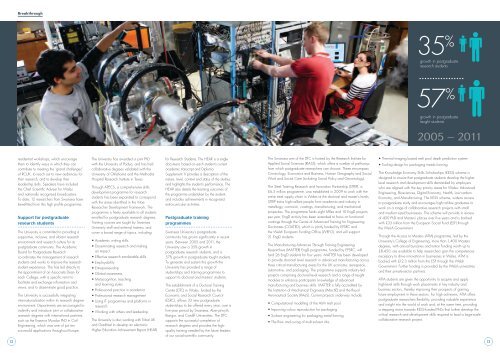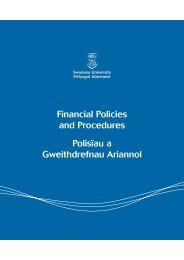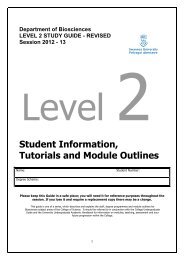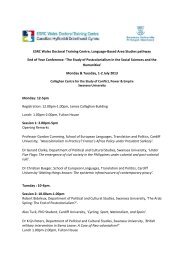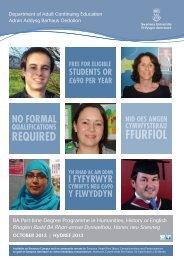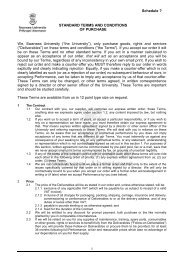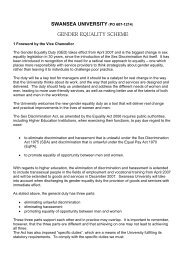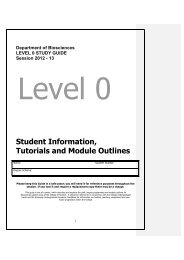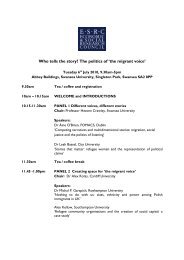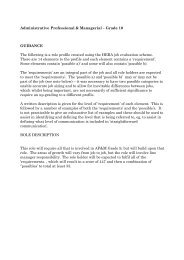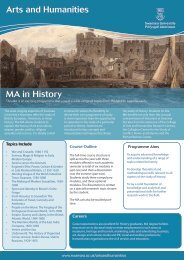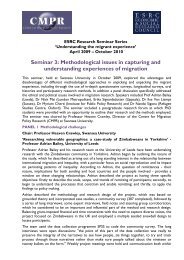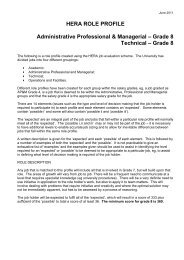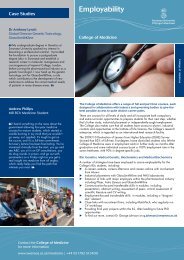Breakthrough 2013 (PDF) - Swansea University
Breakthrough 2013 (PDF) - Swansea University
Breakthrough 2013 (PDF) - Swansea University
You also want an ePaper? Increase the reach of your titles
YUMPU automatically turns print PDFs into web optimized ePapers that Google loves.
<strong>Breakthrough</strong><br />
35 %<br />
growth in postgraduate<br />
research students<br />
57 %<br />
growth in postgraduate<br />
taught students<br />
2005 – 2011<br />
residential workshops, which encourage<br />
them to identify ways in which they can<br />
contribute to meeting the “grand challenges”<br />
of RCUK, to reach out to new audiences for<br />
their research, and to develop their<br />
leadership skills. Speakers have included<br />
the Chief Scientific Adviser for Wales<br />
and nationally recognised broadcasters.<br />
To date, 12 researchers from <strong>Swansea</strong> have<br />
benefitted from this high profile programme.<br />
Support for postgraduate<br />
research students<br />
The <strong>University</strong> is committed to providing a<br />
supportive, inclusive, and vibrant research<br />
environment and research culture for its<br />
postgraduate community. The Academic<br />
Board for Postgraduate Research<br />
co-ordinates the management of research<br />
students and works to improve the research<br />
student experience. This has led directly to<br />
the appointment of an Associate Dean for<br />
each College, with a specific remit to<br />
facilitate and exchange information and<br />
views, and to disseminate good practice.<br />
The <strong>University</strong> is successfully integrating<br />
internationalisation within its research degree<br />
environment. Departments are encouraged to<br />
indentify and introduce joint or collaborative<br />
research degrees with international partners,<br />
such as the Erasmus Mundus PhD in Civil<br />
Engineering, which was one of just ten<br />
successful applications throughout Europe.<br />
The <strong>University</strong> has awarded a joint PhD<br />
with the <strong>University</strong> of Padua, and has had<br />
collaborative degrees validated with the<br />
<strong>University</strong> of Oklahoma and the Methodist<br />
Hospital Research Institute in Texas.<br />
Through APECS, a comprehensive skills<br />
development programme for research<br />
students has been expanded to correspond<br />
with the areas identified in the Vitae<br />
Researcher Development Framework. The<br />
programme is freely available to all students<br />
enrolled for postgraduate research degrees.<br />
Training courses are taught by <strong>Swansea</strong><br />
<strong>University</strong> staff and external trainers, and<br />
cover a broad range of topics, including:<br />
• Academic writing skills<br />
• Disseminating research and making<br />
an impact<br />
• Effective research transferable skills<br />
• Employability<br />
• Entrepreneurship<br />
• Global awareness<br />
• Metacognition, teaching<br />
and learning styles<br />
• Professional practice in academia<br />
• Professional research management<br />
• Using IT programmes and platforms in<br />
research<br />
• Working with others and leadership.<br />
The <strong>University</strong> is also working with Tribal UK<br />
and GradIntel to develop an electronic<br />
Higher Education Achievement Report (HEAR)<br />
for Research Students. The HEAR is a single<br />
document, based on each student’s current<br />
academic transcript and Diploma<br />
Supplement. It provides a description of the<br />
nature, level, context and status of the studies,<br />
and highlights the student’s performance. The<br />
HEAR also details the learning outcomes of<br />
the programme undertaken by the student,<br />
and includes achievements in recognised<br />
extra-curricular activities.<br />
Postgraduate training<br />
programmes<br />
<strong>Swansea</strong> <strong>University</strong>’s postgraduate<br />
community has grown significantly in recent<br />
years. Between 2005 and 2011, the<br />
<strong>University</strong> saw a 35% growth in<br />
postgraduate research students, and a<br />
57% growth in postgraduate taught students.<br />
To generate and sustain this growth the<br />
<strong>University</strong> has provided a range of<br />
studentships and training programmes to<br />
support its doctoral and masters’ students.<br />
The establishment of a Doctoral Training<br />
Centre (DTC) in Wales, funded by the<br />
Economic and Social Research Council<br />
(ESRC), allows 33 new postgraduate<br />
studentships to be offered every year, over a<br />
five-year period by <strong>Swansea</strong>, Aberystwyth,<br />
Bangor, and Cardiff Universities. The DTC<br />
supports the successful completion of<br />
research degrees and provides the highquality<br />
training needed by the future leaders<br />
of our social-scientific community.<br />
The <strong>Swansea</strong> arm of the DTC is hosted by the Research Institute for<br />
Applied Social Sciences (RIASS), which offers a number of pathways<br />
from which postgraduate researchers can choose. These encompass<br />
Criminology, Economics and Business, Human Geography and Social<br />
Work and Social Care (including Social Policy and Gerontology).<br />
The Steel Training Research and Innovation Partnership (STRIP), a<br />
£6.5 million programme, was established in 2009 to work with the<br />
entire steel supply chain in Wales at the doctoral and master’s levels.<br />
STRIP trains high-calibre people from academia and industry in<br />
metallurgy, corrosion, coatings, manufacturing, and mechanical<br />
properties. The programme funds eight MRes and 10 EngD projects<br />
per year. EngD activity has been extended to focus on functional<br />
coatings through the Centre of Advanced Training for Engineering<br />
Doctorates (COATED), which is jointly funded by EPSRC and<br />
the Welsh European Funding Office (WEFO), and will support<br />
21 EngD students.<br />
The Manufacturing Advances Through Training Engineering<br />
Researchers (MATTER) EngD programme, funded by EPSRC, will<br />
fund 26 EngD students for four years. MATTER has been developed<br />
to provide doctoral level research in advanced manufacturing across<br />
three critical manufacturing areas for the UK economy: aerospace,<br />
automotive, and packaging. The programme supports industry-led<br />
projects comprising doctoral level research and a range of taught<br />
modules to enhance participants’ knowledge of advanced<br />
manufacturing and business skills. MATTER is fully accredited by<br />
the Institution of Mechanical Engineers (IMechE) and the Royal<br />
Aeronautical Society (RAeS). Current projects underway include:<br />
• Computational modelling of the ALM melt pool<br />
• Improving colour reproduction for packaging<br />
• Surface engineering for packaging metal forming<br />
• The flow and curing of multi-solvent inks<br />
• Thermal imaging based melt pool depth prediction system<br />
• Tooling design for packaging metals forming.<br />
The Knowledge Economy Skills Scholarships (KESS) scheme is<br />
designed to ensure that postgraduate students develop the higher<br />
level research and development skills demanded by employers<br />
who are aligned with the key priority areas for Wales: Advanced<br />
Engineering, Biosciences, Digital Economy, Health, Low-carbon<br />
Economy, and Manufacturing. The KESS scheme, widens access<br />
to postgraduate study and encourages high-calibre graduates to<br />
work on a range of collaborative research projects with small<br />
and medium-sized businesses. The scheme will provide in excess<br />
of 400 PhD and Masters’ places over five years and is backed<br />
with £33 million from the European Social Fund (ESF) through<br />
the Welsh Government.<br />
Through the Access to Masters (ATM) programme, led by the<br />
<strong>University</strong>’s College of Engineering, more than 1,400 Masters’<br />
degrees, with annual bursaries and tuition funding worth up to<br />
£8,450, are available to help researchers gain the competences<br />
necessary to drive innovation in businesses in Wales. ATM is<br />
backed with £12.3 million from the ESF through the Welsh<br />
Government. Further funding is provided by the Welsh universities<br />
and their private-sector partners.<br />
ATM students are given the opportunity to acquire and apply<br />
high-level skills through work placements in key industry and<br />
business sectors, thereby improving their prospects of gaining<br />
future employment in these sectors. For high achievers, ATM offers<br />
postgraduate researchers flexibility; providing valuable experience<br />
and insight into the world of work and, at the same time, providing<br />
a stepping stone towards KESS-funded PhDs that further develop the<br />
critical research and development skills required to lead a large-scale<br />
collaborative research project.<br />
12<br />
13


